used to 用法
used to的用法详解

used to的用法详解
"used to"是一个英语词组,有以下几种用法:
1. 表示过去的习惯或经常性的动作。
例如:
- I used to go jogging every morning.(我过去经常早上去跑步。
)- She used to live in London.(她过去住在伦敦。
)
2. 表示过去的事实或状态,在现在已经不再存在。
例如:
- That building used to be a hospital.(那座建筑过去是一家医院。
)
3. 表示过去某种特定方式或情况,强调与现在的不同。
例如:- I used to be shy, but now I'm more outgoing.(我过去很害羞,
但现在我更外向了。
)
4. 在否定句和疑问句中,表示过去的否定或疑问。
例如:
- Did you used to play piano?(你过去弹钢琴吗?)
- I didn't use to like spicy food.(我过去不喜欢辣食。
)
需要注意的是,"used to"后面一般接动词的原形。
此外,在现
代英语中,"used to"通常只用于过去时,要表示现在的习惯,
应该使用"usually"或其他合适的表达方式。
usedto用法及含义

usedto用法及含义used to是一个常用的英语词组,通常用于表示过去的习惯、状态或经验,意为“过去常常、曾经”,常与动词原形连用。
下面是用法及含义的详细解释。
一、用法1. 用于描述过去的习惯或状态例如:I used to live in New York.(我过去住在纽约。
)2. 用于描述过去的经验例如:I used to play football when I was younger.(我年轻的时候过去常踢足球。
)3. 用于与现在进行比较,表示一种不同的情况或状态例如:I used to smoke, but I quit last year.(我过去吸烟,但去年戒了。
)4. 用于疑问句中询问过去的习惯或状态例如:Did you use to live in London?(你过去住在伦敦吗?)二、含义1. 过去经常做某事例如:She used to eat dinner at 7pm every day.(她过去每天晚上7点吃晚饭。
)2. 过去曾经有某种状态例如:I used to be afraid of dogs when I was a child.(我小时候过去曾经害怕狗。
)3. 过去有某种经验或习惯例如:He used to work as a waiter before he became a chef.(他过去做过侍者,在成为厨师之前。
)4. 相较于现在,曾经有不同的情况或状态例如:My brother used to be very shy, but he is very outgoing now.(我哥哥过去很害羞,但现在很外向。
)总之,used to是表示过去的常用词组,常用于描述过去的习惯、状态或经验,而与现在进行比较。
掌握used to的用法和含义,对于提高英语口语和写作能力都是非常有帮助的。
中考英语复习 语法:used to 的用法(讲义及练习)
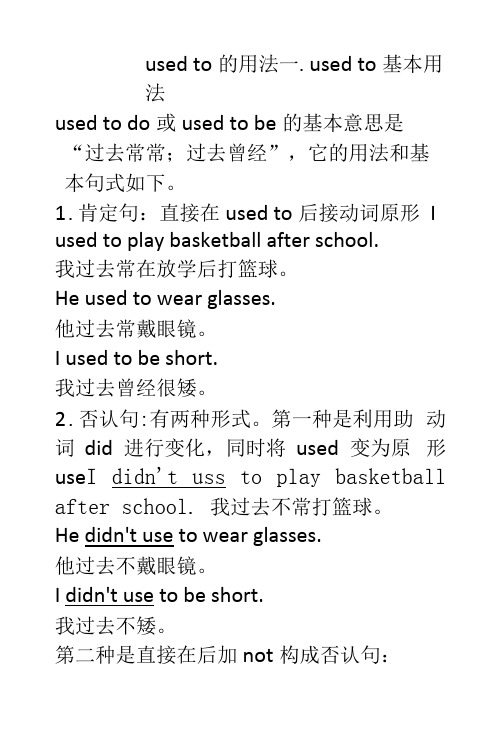
used to的用法一.used to基本用法used to do或used to be的基本意思是“过去常常;过去曾经”,它的用法和基本句式如下。
1.肯定句:直接在used to后接动词原形I used to play basketball after school.我过去常在放学后打篮球。
He used to wear glasses.他过去常戴眼镜。
I used to be short.我过去曾经很矮。
2.否认句:有两种形式。
第一种是利用助动词did进行变化,同时将used变为原形use I didn't uss to play basketball after school. 我过去不常打篮球。
He didn't use to wear glasses.他过去不戴眼镜。
I didn't use to be short.我过去不矮。
第二种是直接在后加not构成否认句:school.(改为否认句)Tom used to be a quiet boy.(改为一般疑问句并作否认回答)22.我过去常常和朋友们一起打棒球。
(翻译句子)There used to a stone bridge over the river. (be )The key:l.C2.B3.B4.D5.C5.B7.A8.B9.A10.A11. C 12.D 13.Bdidn/t he/ usedn't he14.MakingDrinking15.to cut/for cuttingPlaying16.fish/go fishingbe nervous about17.My brother didn't use to play soccer at school.或My brother usedn't to play soccer at school.18.Did Tom use to be a quiet boy, didn't he?No, he didn't.19.I used to play baseball with my friends.20.beI used not to play basketball after school. He used not to wear glasses.I used not to be short.3.一般疑问句:有两种形式,第一种是利用助动词did进行变化,同时把used 变为use,如:Did you use to play basketball after school? 你过去常在放学后打篮球吗?肯定回答:Yes, I did.否认回答:No, I didn't.Did he use to wear glasses?Yes, he did.No, he didn't.Did you use to be short?你过去矮吗?Yes, I did.No, I didn't.4.反义疑问句You used to be short, didn't you?你过去很矮,不是吗?Yes, I did.是的,我过去很矮。
used to 的用法
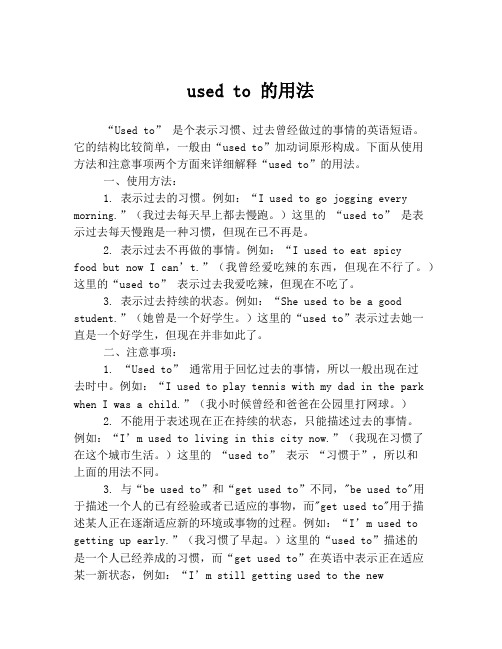
used to 的用法“Used to” 是个表示习惯、过去曾经做过的事情的英语短语。
它的结构比较简单,一般由“used to”加动词原形构成。
下面从使用方法和注意事项两个方面来详细解释“used to”的用法。
一、使用方法:1. 表示过去的习惯。
例如:“I used to go jogging every morning.”(我过去每天早上都去慢跑。
)这里的“used to” 是表示过去每天慢跑是一种习惯,但现在已不再是。
2. 表示过去不再做的事情。
例如:“I used to eat spicyfood but now I can’t.”(我曾经爱吃辣的东西,但现在不行了。
)这里的“used to” 表示过去我爱吃辣,但现在不吃了。
3. 表示过去持续的状态。
例如:“She used to be a good student.”(她曾是一个好学生。
)这里的“used to”表示过去她一直是一个好学生,但现在并非如此了。
二、注意事项:1. “Used to” 通常用于回忆过去的事情,所以一般出现在过去时中。
例如:“I used to play tennis with my d ad in the park when I was a child.”(我小时候曾经和爸爸在公园里打网球。
)2. 不能用于表述现在正在持续的状态,只能描述过去的事情。
例如:“I’m used to living in this city now.”(我现在习惯了在这个城市生活。
)这里的“used to” 表示“习惯于”,所以和上面的用法不同。
3. 与“be used to”和“get used to”不同,"be used to"用于描述一个人的已有经验或者已适应的事物,而"get used to"用于描述某人正在逐渐适应新的环境或事物的过程。
例如:“I’m used to getting up early.”(我习惯了早起。
used to 的综合用法

二、used to的句子结构
• 3、一般疑问句结构 ①Used +主语+to do sth? Used you to play football after school? 你过去经常在放学后踢足球吗? Yes,I used to./ No, I usedn’t. 是的,经常踢。/不,不经常踢。 ②Did +主语+use to do sth? Did you use to play football after school? Yes, I did./ No, I didn’t.
used to的用法总结
个人原创 九年级适用
一、used to的基本概念
•的是一般过去时。 • She used to do her homework with her mother’s help. • 她过去经常在妈妈的帮助下做作业。
二、used to的句子结构
三、相关词组辨析
• used to do sth 过去常常做某事 • be used to do sth 被用于做某事 • be used to doing sth 习惯于做某事,适应了做某事 • be used for sth/ doing sth 被用于做某事 • be used as sth 被用作某物 • be used by sb 被某人使用
三、相关词组辨析
• 例子: • (1)He used to play computer games after school. 他过去经常在放学后玩电脑游戏。 He used to be very thin when he was young. 他小时候很瘦. (2)The paper is used to write on. =The paper is used for writing on. 这张纸被用来书写。
used to的用法总结
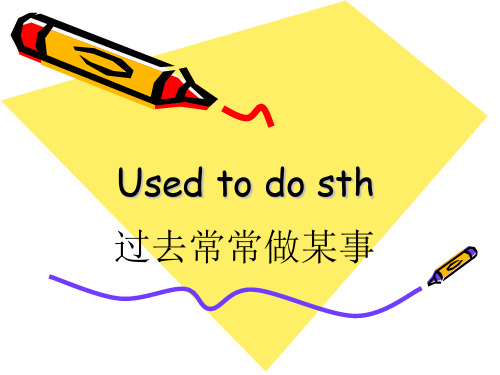
Used to的运用在there be句型中
• There used to be There used to be a lot of teachers in the
school.过去这个学校有很多老师。 100年前曾经有一个美丽的乡村在这个国家。 100 years ago, there used to be a beautiful village in the country.
他过去烟抽得多吗?
Used to 的反义疑问句
反义疑问句 主语+used to do sth, didn’t +主语?
usedn’t+主语?
You used to be a teacher, didn’t you? usedn’t you?
你以前是老师,难道不是吗? He used to watch TV a lot , didn’t he?
相关词组辨析
(3)The picture is used as the cover of the magazine. 这幅照片被那本杂志用作了封面。
(4)The room is used by Mike. 这个房间是由迈克使用的。
Used to 用于否定句和疑问句中通常要用did.
1. 我过去不喜欢爵士乐。 I ___d_id_n_'_t_u_s_e__to________like jazz.
过去有一个非常聪明的老头住在这个村子里
There used to be a clever old man in the village.
相关词组辨析
• used to do sth 过去常常做某事 • be used to doing sth 习惯于做某事,适
应了做某事
usedto用法总结归纳
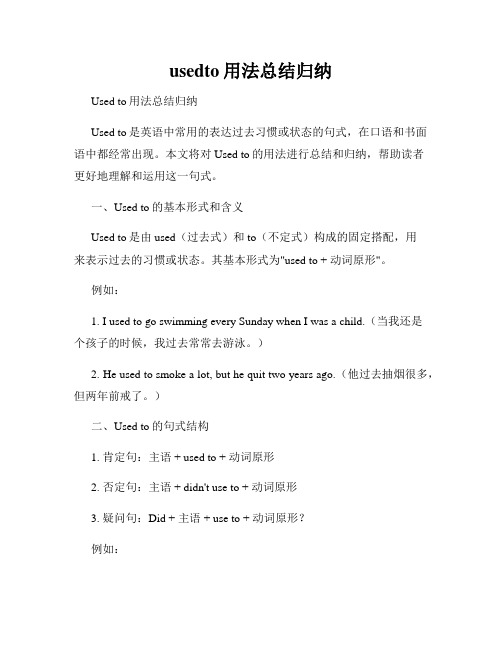
usedto用法总结归纳Used to用法总结归纳Used to是英语中常用的表达过去习惯或状态的句式,在口语和书面语中都经常出现。
本文将对Used to的用法进行总结和归纳,帮助读者更好地理解和运用这一句式。
一、Used to的基本形式和含义Used to是由used(过去式)和to(不定式)构成的固定搭配,用来表示过去的习惯或状态。
其基本形式为"used to + 动词原形"。
例如:1. I used to go swimming every Sunday when I was a child.(当我还是个孩子的时候,我过去常常去游泳。
)2. He used to smoke a lot, but he quit two years ago.(他过去抽烟很多,但两年前戒了。
)二、Used to的句式结构1. 肯定句:主语 + used to + 动词原形2. 否定句:主语 + didn't use to + 动词原形3. 疑问句:Did + 主语 + use to + 动词原形?例如:1. She used to play the piano when she was young.(她小时候常常弹钢琴。
)2. They didn't use to live in this city.(他们过去不住在这个城市。
)3. Did you use to go camping with your friends?(你过去常常和朋友们一起去野营吗?)三、Used to与现在状态的对比Used to通常用来表示过去的习惯或状态,与现在的情况相对比,可以形成鲜明的对比。
常用的表达方式有"used to...but now..."和"didn't use to...but now..."。
例如:1. I used to love playing video games, but now I prefer reading books.(我过去喜欢玩电子游戏,但现在更喜欢读书。
usedto的用法和搭配
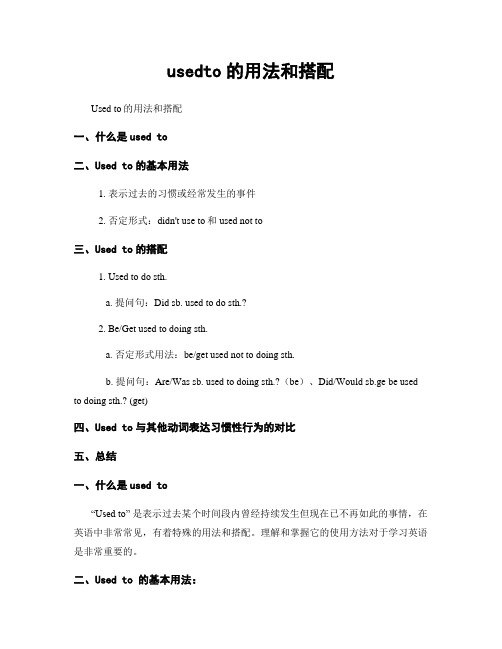
usedto的用法和搭配Used to的用法和搭配一、什么是used to二、Used to的基本用法1. 表示过去的习惯或经常发生的事件2. 否定形式:didn't use to和used not to三、Used to的搭配1. Used to do sth.a. 提问句:Did sb. used to do sth.?2. Be/Get used to doing sth.a. 否定形式用法:be/get used not to doing sth.b. 提问句:Are/Was sb. used to doing sth.?(be)、Did/Would sb.ge be used to doing sth.? (get)四、Used to与其他动词表达习惯性行为的对比五、总结一、什么是used to“Used to” 是表示过去某个时间段内曾经持续发生但现在已不再如此的事情,在英语中非常常见,有着特殊的用法和搭配。
理解和掌握它的使用方法对于学习英语是非常重要的。
二、Used to 的基本用法:1. 表示过去的习惯或经常发生事件:“Used to + 动词原形” 可以用来描述过去频繁做过却现在已经停止的行为,与现在已不再做这件事情相关。
例如:- I used to go swimming every summer.(我过去每个夏天都会去游泳。
)- She used to live in London.(她过去住在伦敦。
)2. 否定形式:didn't use to和used not to如果需要表示“过去不习惯于做某事”或者“过去没有某种现象”,则可以使用“didn't use to” 或“used not to”。
例如:- I didn't use to like coffee, but now I do.(我过去不喜欢咖啡,但现在喜欢了。
)- He used not to eat vegetables, but now he is a vegetarian.(他以前不吃蔬菜,但现在是素食主义者。
语法讲解(used to的用法)
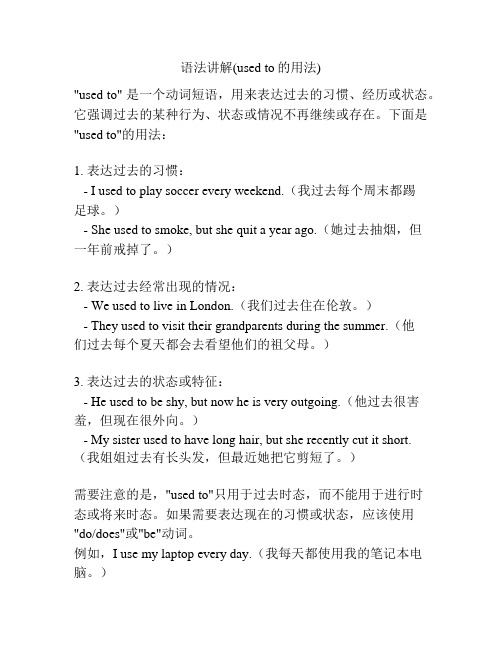
语法讲解(used to的用法)"used to" 是一个动词短语,用来表达过去的习惯、经历或状态。
它强调过去的某种行为、状态或情况不再继续或存在。
下面是"used to"的用法:1. 表达过去的习惯:- I used to play soccer every weekend.(我过去每个周末都踢足球。
)- She used to smoke, but she quit a year ago.(她过去抽烟,但一年前戒掉了。
)2. 表达过去经常出现的情况:- We used to live in London.(我们过去住在伦敦。
)- They used to visit their grandparents during the summer.(他们过去每个夏天都会去看望他们的祖父母。
)3. 表达过去的状态或特征:- He used to be shy, but now he is very outgoing.(他过去很害羞,但现在很外向。
)- My sister used to have long hair, but she recently cut it short.(我姐姐过去有长头发,但最近她把它剪短了。
)需要注意的是,"used to"只用于过去时态,而不能用于进行时态或将来时态。
如果需要表达现在的习惯或状态,应该使用"do/does"或"be"动词。
例如,I use my laptop every day.(我每天都使用我的笔记本电脑。
)He is a teacher.(他是一名老师。
)在疑问句和否定句中,应将"used to"放在助动词或情态动词之前:- Did you use to play basketball when you were younger?(你年轻时玩篮球吗?)- She didn't use to eat vegetables, but now she does.(她过去不吃蔬菜,但现在吃。
(完整版)usedto用法讲解
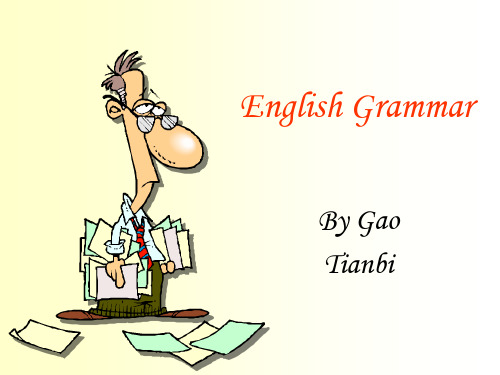
be used to do sth
意为“被用来做某事”,to后 面加动词原形
This knife is used to cut bread. 这把刀是用来切面包的。 The food is used to eat.
A.was used to tell B.is used to telling ed to tell ed to telling
3.My father is used to___early now.
A.get up B.getting up C.got up D.gets up
Bபைடு நூலகம்
ually computers___ to surf the Internet.
主语+used to+动词原形
2.表示过去的某种经常性的 行为或动作,这种动作现在 已经不存在
3.只能用于一般过去时, 不能用于现在时态
否定形式: 主语+didn’t use to+动词原形
Jack didn’t use to like pop songs. 杰克过去常常不喜欢流行歌曲。 一般疑问句形式:
食物是被用来吃的。
Practise makes perfect
1.When I was a child, I used to___
chocolate.
B
A.liking B.like C.liked D.likes
2.My mother____us stories
when we were children. C
e
B.are using
C C.are used ed
used-to-用法及练习

used to用法定义:used to:过去常常做,现在不做了。
例:My uncle used to go to work on foot. 我叔叔过去常常步行去上班。
1. 否定句used to的否定式通常为didn’t use to。
如:She didn’t use to have long hair.2. 一般疑问句含有used to的句子变为一般疑问句时, 可用“助动词Did+主语+use to do sth. ?”结构。
肯定回答用Yes, sb. did;否定回答用No, sb. didn’t。
如:Did you use to play the piano? —Yes, I did. /No, I didn’t. 3. 特殊疑问句含有used to的特殊疑问句的结构为“疑问词+助动词did+主语+use to do...?”。
如:What did you use to do? —I used to collect stamps.4. 反意疑问句如果陈述部分含有used to, 附加疑问部分通常使用助动词did来引导。
如:The house used to be a sh op, didn’t it?疑难点:be used to do表示“被用来做某事”。
例句:Wood is often used to make desks and chairs.木头常常被用来制作桌椅。
be used to doing /n. 表示:习惯于如:He is used to hard work. 他习惯于艰苦的工作。
She is not used to eating Chinese food. 她不习惯吃中餐。
句子练习1.我父亲过去常在这条河里捉鱼。
My father ________ ________ ______fishes in the river.2. 你曾经当过老师吗?——是的,当过。
但我以前没教过英语。
used to 的用法和搭配

used to 的用法和搭配一、什么是"used to"?"Used to" 是一个表达过去习惯性或经常发生情况的短语,常用于肯定句和否定句中。
它表示过去的状态、行为或习惯在现在已经不再存在。
它的基本结构为"used to + 原型动词"。
1.1 过去习惯行为"Used to" 用来描述在过去某一段时间内反复发生或持续存在的习惯性行为。
比如:I used to walk my dog every morning.(我过去常常每天早晨遛狗)1.2 过去形容状态除了描述过去经常发生的行为,"used to" 也可表示一种过去曾有但现在不再具备的状态。
例如:He used to be very shy when he was a child.(他小时候非常害羞)二、 "used to" 的语法用法2.1 肯定句结构在肯定句中,我们使用"used to + 动词原型" 的形式来表示过去的习惯或状态,其中动词原型不随人称和时态变化。
例如:- We used to live in the countryside when I was young.(当我年轻时,我们住在乡下)- She used to work in a bank before she started her own business.(她开始自己创业前曾在银行工作)2.2 否定句结构在否定句中,用 "did not use to + 动词原型" 的形式来表示过去的否定习惯或状态。
例如:- I did not use to enjoy swimming, but now I love it.(过去我不喜欢游泳,但现在很喜欢)- They did not use to drink coffee, but now they can't start their day without it.(过去他们不喝咖啡,但现在一天不能没有它)2.3 疑问句结构在疑问句中要使用辅助动词 "did" 加上主语和"use to" 来提问过去的习惯或状态。
Usedto用法小结

Usedto用法小结Used to是英语中一个常用的结构,表示过去经常做的事情,现在不再做了,相当于中文中的“过去经常”,其基本形式为used to + 动词原形,有时也可用would + 动词原形来表示。
下面是used to用法的小结。
【语法结构】一般将used to视为一个动词短语,由used与to组成。
used to作为一个辅助动词用于表示过去的习惯或经常性行为。
在使用过程中,used to后面的动词一般使用原形,而不使用-ing形式。
肯定句:主语 + used to + 动词原形例如:I used to go to the gym every morning.我过去经常去健身房。
She used to play the piano when she was young.她年轻的时候经常弹钢琴。
否定句:主语 + didn't use to + 动词原形例如:I didn't use to watch TV before going to bed.我以前不在睡觉前看电视。
She didn't use to eat meat, but now she does. 她以前不吃肉,但现在吃了。
疑问句:Did + 主语 + use to + 动词原形?例如:Did you use to take the bus to work?你过去经常坐公交车上班吗?Did she use to live in New York City?她过去住在纽约吗?【常见用法】1. 表示过去的经常性或习惯性动作例如:I used to smoke, but I gave it up.我过去常吸烟,但我戒了。
He used to be a teacher, but now he is a writer.他过去是一名教师,但现在是一名作家。
2. 表示过去的做法或状态例如:She used to live in a small apartment.她以前住在一个小公寓里。
used to用法总结

used to用法总结Used to 是英语中常用的一个表达方式,表示过去某种状态、行为或习惯,现在已经不再存在或发生了改变。
它在句子中通常用来表示过去的情况,和现在的对比。
下面总结了一些常见的 Used to 的用法。
首先,Used to 可以用来表示过去的行为或习惯。
当我们想要描述过去经常或习惯性地做的事情,但是现在已经不再这样做时,可以使用 Used to。
例如:“I used to play soccer every weekend when I was younger.”(我年轻的时候每个周末都踢足球。
)这句话表示过去的习惯,现在已经不再踢足球了。
其次,Used to 也可以表示过去的状态。
当我们想要描述过去存在的某种状态或情况,并且现在已经发生了改变时,可以使用 Used to。
例如:“He used to be very shy, but now he is very outgoing.”(他过去很害羞,但现在很外向。
)这句话表示过去的状态已经发生了改变。
另外,Used to 还可以用来谈论过去的真理或事实,但现在已经不再适用。
例如:“Ciga rettes used to be considered fashionable, but now we know the dangers of smoking.”(过去香烟被认为是时尚的,但现在我们知道吸烟的危害。
)这句话强调过去的观念已经发生了改变,现在不再认为吸烟是时尚的。
需要注意的是,Used to 在句子中通常与动词的原形一起使用。
例如:“She used to live in Paris.”(她过去住在巴黎。
)在否定句和疑问句中,Used to 有时会被缩写为 "didn't use to" 或 "didyou use to"。
例如:“I didn't use to like sushi, but now I love it.”(过去我不喜欢寿司,但现在我喜欢。
used to 用法

ed to表示过去的习惯或过去某时期的状况,但现在已不存在。
eg.①He used to drink tea but now he drinks coffee. 他过去总是喝茶但现在他喝咖啡了。
(强调现在不喝茶了)②I know where there used to be a river here. 我知道这儿以前哪里有条河。
(现在没有河了)③When I was a child, I didn't use to like tomatoes. 我小时候不喜欢吃西红柿。
④He is not what he used to be.. 他已不是原来的他了。
⑤Where did you use to live before you came here? 来此之前你住在什么地方?2.would 和used to的用法区别。
(1) used to表示过去与现在或过去某时与后来的情况有不同,强调“现已无此习惯了”,而would只表示过去的情况,与现在无关。
eg.①When he was young, he would smoke a lot.他年轻时总是吸许多烟。
(不含有和现在比较,现在他也许还在抽,也许不抽了。
)②He used to live in the country, but now he lives in the city. 他过去住在乡下,现在住在城里。
(2) used to可表示过去的习惯动作或状态,而would只表示过去的习惯动作。
eg.①Kate used to be very thin. 以前凯特非常瘦。
②There used to be a building at the street corner, but it has been pulled down.街道拐角处过去有座楼房,现在拆了。
(不用would)(3) used to可泛指过去的习惯动作或状态,而would表示过去的习惯动作时,往往要带有一个特定的时间状语。
- 1、下载文档前请自行甄别文档内容的完整性,平台不提供额外的编辑、内容补充、找答案等附加服务。
- 2、"仅部分预览"的文档,不可在线预览部分如存在完整性等问题,可反馈申请退款(可完整预览的文档不适用该条件!)。
- 3、如文档侵犯您的权益,请联系客服反馈,我们会尽快为您处理(人工客服工作时间:9:00-18:30)。
• B. 动词填空: • 1. You’ll soon get used to living _________(live) in the country. eat • 2. I never used to _________(eat) cakes, but I ___________________(eat) a lot now. am used to eating • 3. Pens are used to _________(write). write • 4. When I was young I was used to ____________(walk) before going to bed. walking go • 5. I used to ___________(go) swimming on Saturdays. live • 6. Didn’t she use to ______ (live) in Germany?
2、 be used to doing
• be used to doing:习惯于做某事. • to是介词,后需加名词或动名词. • 我表弟已经习惯和他的新朋友在澳大利亚 一起学习了。 • My cousin is used to studying with his new friends in Australia. • 妈妈习惯于一大清早起来为我们做早饭。 • My mother is used to getting up early to make breakfast for us.
注意:be used to do
• A. 选用适当的词组填空: used to • 1. Life here is much easier than it ________ be. • 2. I’ve lived in Paris for six years now, so used to I’m quite _________ the traffic. • 3. It’s difficult to understand British people are not used to if you_________________ their culture. • 4. I don’t play tennis much these days, but I used to ____________. is used to • 5. The wood ______________ make desks and chairs.
注意:be used to doing
3、 be used to do
• be used to do: 被用来做某事
• • • • • •
这把刀子是用来切西瓜的。 This knife is used to cut wa make paper. 过去,这个大厅被用来开会。 The hall was used to hold a meeting.
• 我过去一直住在伦敦。 • I used to live in London.
• 过去我们经常种上美丽的玫瑰花。 • We used to grow beautiful roses. • 妈妈以前没有如此健忘。 • Mother used not to be so forgetful.
注意:used to后加
小结
• • • • • • used to do 过去常常做某事 be used to doing 习惯于做某事 be used to do 被用来做某事
执教人:于冬云 镇海区仁爱中学
• • • • • • • • • • • •
•1. D 2. A 3. B 4. C 1. There ________ a lot of trees in this area. A. was used to B.was used to be ed to ed to be 2. She used to _____with her parents, but now she is used to ____ with her classmates at school. A. live; living B.live; live C.living; living D.living; live 3. By now he has been used to ___ in the big city, although he used to ____ in a small village. A. live; living B.living; live C.living;living D.live; live 4. Mrs Green _______ go to hospital every day, but now she is in good health. A. has to B.need to ed to D.was used to
• 布朗先生还没有习惯晨跑。 • Mr Brown is not used to running early in the morning. • Jim 住在澳大利亚已经两年了,他已经习惯 靠左行驶了。 • Jim has lived in Australia for two years. He is used to driving on the left. • 在我很小的时候,我已经习惯每天弹琴1小时 了。 • When I was young, I was used to playing the piano for one hour every day.
used to 用法
used to do
过去常常做某事
be used to doing 习惯于做某事 be used to do
被用来做某事
1、used to do
• used to do表示过去常常做某事,指的是 过去习惯性的动作或状态(现在已不如此) • 过去我常常在放学后踢球. • I used to play football after school. • (现在不踢球了。) • Tom过去常常散步。 • Tom used to take a walk. • (现在不去散步了。)
原形
used to 的否定和疑问
• • • • • • • • • • • 正式形式: 否定为usedn’t 疑问为used提前。 I usedn’t to like her. 我未曾喜欢过她。 Used you to go there? 您过去可常去那里? There used to be a cinema here, usedn’t there? 这里曾经有个电影院,不是吗? 非正式形式(口语中或不拘谨的书面语中) : 其否定及疑问形式均与did连用。 I didn’t use to like her. Did you use to go there? There used to be a cinema here, didn’t there?
